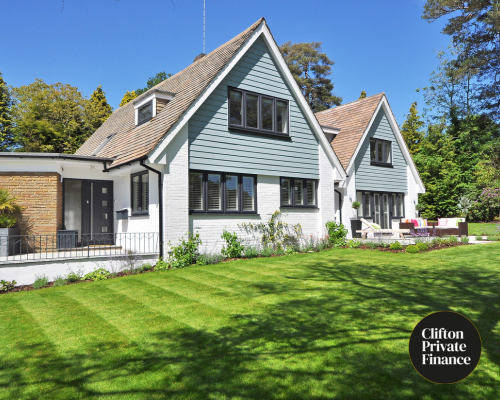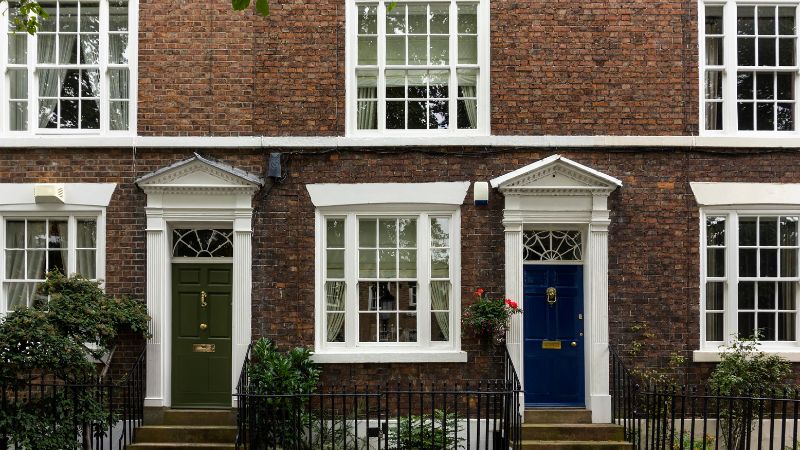Categories
The Mortgage Application Process Explained
.jpg)
It is normal to be nervous about a mortgage application. When you are looking to make a large and long time financial commitment to purchase a property, it is important that you understand the process and prepare properly. This makes the whole process smoother and gives you the confidence that you’re doing it all right.
At Clifton Private Finance, we help our clients get the mortgages they need, working hand-in-hand with you through the mortgage application process from the very start to the moment you get the keys. Let us explain how the mortgage application process works in this easy to digest guide.
Table of Contents
- Starting the Mortgage Journey
- Getting an Agreement in Principle (AIP)
- Finding Your Property & Making an Offer
- The Full Mortgage Application
- Understanding Property Surveys & Valuations
- Receiving Your Mortgage Offer
- The Role of the Conveyancer (Solicitor)
- Exchange, Completion & Getting the Keys
- How Clifton Private Finance Helps
Get a Free Quote
Starting the Mortgage Journey
For many people, the beginning of the mortgage application process is daunting. This is especially true if you’ve never done it before or if it’s been decades since your last mortgage - and it’s understandable. Thankfully, there are people who work with mortgages all day, every day, and we’re here to help you navigate it smoothly.
The first step starts when you decide that you want to buy a house. Questions immediately occur:
- How big a mortgage can I get?
- What size deposit will I need to save?
- Do I have enough income?
- Is my credit rating good enough?
- How long will it take?
- What will the monthly repayments be?
The best way to answer these questions quickly is to speak to an advisor. Contact Clifton Private Finance today and speak to our mortgage team, even if you are this early in your thinking - especially if you’re this early. We can get you on the right path straight away.
Some simple answers to the questions though:
- Most mortgage lenders will be able to give you a mortgage that’s around four times your annual income.
- You should look for a 10% minimum deposit (£30,000 on a £300,000 house, for example)
- You will have to pass a mortgage affordability check that measures your income against your outgoings. Find out more in our guide to How Mortgage Affordability Checks Work.
- You will need a good credit rating for the best mortgage rates, but specialist lenders are here to help you if you have a poorer credit history - speak to an advisor to find out more.
- A mortgage typically takes four to six weeks. You can find out more in our article How Long Does a Mortgage Application Take?
- Monthly repayments are based on the size of your mortgage, the length of your mortgage (not all mortgages are 25 years), and the mortgage interest rate.
Getting a mortgage isn’t too hard - with the right guidance, it’s a challenge many people overcome every day. With a solid plan, comprehensive paperwork, plus some flexibility and patience, you’ll achieve the mortgage you need.
Recent Mortgage Case Studies
Getting an Agreement in Principle (AIP)
We said above that a basic guide is to estimate your mortgage size as four times your income, and that is a good guide - but even better is getting an Agreement in Principle (AIP).
An AIP is an early indication from a lender of the mortgage they’d be willing to give you. It’s based on a little trust, because they ask you questions but don’t undertake the same level of thorough check that they will when you make the full mortgage application. If you try to be accurate and don’t exaggerate your circumstances, then the AIP is nearly always the same as the final mortgage.
The AIP is a piece of documentation that you can take with you to an estate agent or seller and use to make an official offer. It gives you the confidence to go shopping for your dream home!
At Clifton Private Finance, our advisors are here to help you get your AIP as quickly as possible. We will help you prepare the paperwork (at this stage, it’s merely ID documentation) and put forward your application to lenders who are best suited to your personal status and need.
With your AIP in hand you will:
- Know your true budget for your home.
- Have the confidence to make an offer.
- Show the seller that you are a serious buyer.
Finding Your Property & Making an Offer
Finding your perfect home is both fun and time consuming. There will be days filled with excitement and others where it can feel like a bit of a grind. Eventually though, you’ll have found a property you want to buy.
Armed with your AIP, you will be able to make an official offer on the house. In the competitive UK property marketplace, things can move quickly, so it’s worth being pro-active if you find somewhere perfect. That said, don’t rush and make the wrong decision and do remember there are other properties out there that will be just as perfect (or even more so).
.png)
The Full Mortgage Application
With your offer accepted, the next stage is to officially apply for the mortgage. We’re here at Clifton Private Finance to make your full mortgage application as effortless as possible.
Working with your mortgage advisor, you need to gather up your official paperwork. This includes:

ID Documentation - Passport or driving licence, proof of address (such as a council tax bill).

Proof of Income - Payslips, SA302 (if self-employed), documents showing other income (such as dividend statements from investments).

Proof of Outgoings - Paperwork for other debts, bank statements, details of dependencies.

Proof of Deposit - Savings bank account statement, deposit provenance. To learn more about deposit proof, read our article What the Mortgage Proof of Deposit Is - And Why You Need It.
We will help you organise and submit your full mortgage application, making sure that everything is error-free to ensure the mortgage is processed as quickly as possible.
Understanding Property Surveys & Valuations
The survey is a very important part of the property purchase and while not strictly part of your mortgage application process, they do form an important stage. Surveys and valuations are taken by both the mortgage lender and (optionally) by you. For the mortgage lender, it’s important for them to assess the property and make sure it is worth the value being placed on it.
Mortgages are measured as an LTV, or loan-to-value. This details the percentage of the property value that is covered by the mortgage and is offset by your deposit. A higher LTV (80% or more) represents a greater risk for the mortgage lender, as it is harder for them to recoup their losses if you default on payments and the property is sold.
It is important that the amount you are paying for the house matches its true value and that its LTV is properly calculated before the mortgage lender can release the funds to buy the property. The lender’s valuation will reassure them that the property is in a good condition and that the amount you’re borrowing reflects the property’s true value
It is also strongly recommended that you undertake a private survey of your own. The lender’s valuation is for their use and rarely will you receive the full documentation relating to it, so a complete homebuyer’s survey will be beneficial. This will highlight any hidden problems, such as structural issues or unforeseen legal rights, which need to be brought into the open and evaluated.
The result of the valuation and the greater underwriting (checking your credit status, evaluating your affordability, determining the suitability of the property for use, etc.) are then all considered to form the lender’s decision regarding your mortgage.
Receiving Your Mortgage Offer
With the underwriting completed, the mortgage lender will give you a formal offer. This will contain:
- The amount - the total of your approved mortgage.
- The interest rate - also known as the mortgage rate, the interest rate represents the level of interest the mortgage will accrue.
- The full mortgage term - often, mortgage terms are 25 years, but they may be longer or shorter as required.
- Current fixed rate term (if applicable) - fixed interest rates are for a set number of years, often 1-, 2-, or 5-year terms, after which you will automatically go to the mortgage lender’s variable base rate (VBR).
- Your monthly repayments - this is calculated based on the rate and term.
- Mortgage fees - mortgage fees are typically folded into the total mortgage balance, and include product fees, valuation fees and more. Other fees that may come into effect later, such as early repayment charges (ERCs) will be detailed.
- Conditions - details such as insurance obligations will be listed as part of the mortgage contract.
- Mortgage offer time limit - Mortgages are only valid for a set time, usually three to six months. This will be clearly laid out.
When you work with Clifton Private Finance, our mortgage advisor will go through the terms of your mortgage with you to make sure you understand every aspect of the offer. You are under no obligation to accept the offer and will have the time to discuss and evaluate every part of the contract before you sign. Having an advisor to help will ensure you are able to make a confident and informed decision before making a final commitment.
If your mortgage is not approved or if the terms are unacceptable, then we will move quickly to find a solution that ensures you don’t lose your property.
The Role of the Conveyancer (Solicitor)
A specialist mortgage solicitor is known as a conveyancer and the work they do is called conveyancing. This involves researching the legal status of the property, checking the contracts, and finally moving the money between parties.
Your conveyancer may be involved earlier, but will definitely be involved by this stage. Delays can come about while the legal team do their work - at Clifton Private Finance we work hand-in-hand with your conveyancer to speed up the process as much as possible.
Exchange, Completion & Getting the Keys
The final step is known as exchange and completion and involves the final exchange of contracts and a date when the sale is completed. At that moment, you will receive the keys and officially become the new owner of the building - congratulations!
We will be with you right until the end, making sure that everything moves smoothly right until those final celebratory moments.
How Clifton Private Finance Helps
At Clifton Private Finance, our team work daily to scour the UK mortgage marketplace for the very best deals for our clients. Our mortgage team will:
- Help you understand the mortgage application process.
- Provide access to the wider mortgage landscape, with both traditional banks and specialist lenders.
- Maximise your mortgage size to ensure you get the home you’re after.
- Get you an Agreement in Principle without delay.
- Work with you to overcome any problems, such as difficulties with self-employed income, poor credit, expat status, or affordability calculations.
- Guide you through the paperwork to get it in order well ahead of time.
- Provide a professional service that ensures everything goes as smoothly and efficiently as possible, removing delays and minimising the threat of gazumping.
- Get you a mortgage with the lowest possible rate.
- Scour through the contract with you to explain each item and make sure you’re happy with the deal.
- Be there to help and reassure at every stage of the process.
For the best mortgage deals, friendliest professional service, and most extensive experience, speak to Clifton Private Finance today and let us get you the mortgage you need.


















